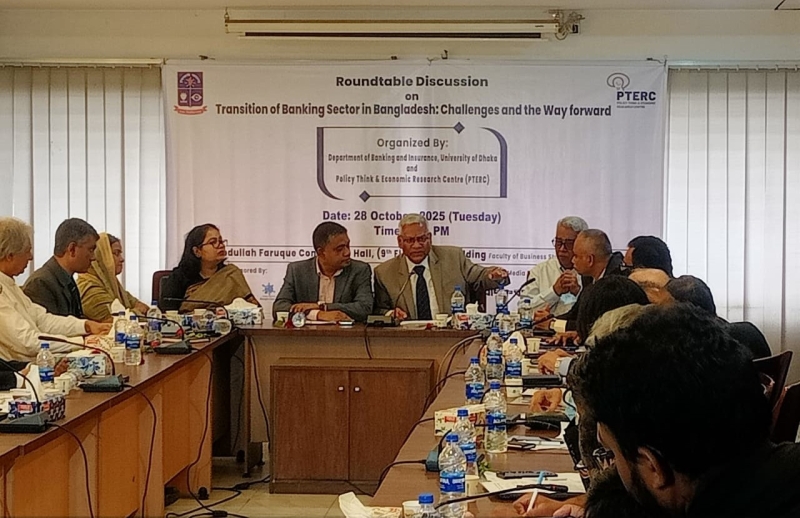- Logi-boitha of 2006 was the 1st reflection of Hasina’s fascism: Rizvi |
- Economists express concern over bank merger; BB remains confident |
- No response on request for Hasina’s extradition: Touhid Hossain |
- Deep relations with US, economic ties with China: Touhid |
- Recommendations on July Charter implementation submitted to CA |
Economists express concern over bank merger; BB remains confident

Roundtable on Transition of the Banking Sector in Bangladesh, challenges and way forward held at the Unibersity of Dhaka on Tuesday 28 Oct 2025.
Dhaka, Oct 28 - Economists and banking experts have expressed deep concern over the government’s plan to merge five struggling Shariah-based banks into a single entity named United Islami Bank, saying such a move will not solve the underlying problems of the banking sector.
Bangladesh Bank, however, remains confident that the merger will help restore depositors’ confidence in the affected banks.
Speaking at a seminar titled ‘Transition of Banking Sector in Bangladesh: Challenges and the Way Forward’ organised by the Department of Banking and Insurance of Dhaka University on Tuesday, experts said merging banks is not a sustainable solution.
Without addressing the root causes, they warned, the crisis could deepen once an elected government takes office.
The central bank has decided to merge five Shariah-based banks — First Security Islami Bank, Social Islami Bank, Global Islami Bank, EXIM Bank, and Union Bank — into one state-owned large Islamic bank. Bangladesh Bank expects to complete the merger by November.
These banks have been plagued by high non-performing loans (NPLs), in some cases exceeding 90 percent, and have repeatedly required liquidity support from the central bank. After several unsuccessful bailouts, the Bangladesh Bank, with the approval of the Finance Ministry and the Council of Advisers, opted for a final merger plan.
“Bailing out private banks with public money is a bad decision. On the other hand, turning distressed banks into state-owned institutions in the name of gaining public confidence is simply cheating,” said former Director General of the Bangladesh Institute of Bank Management (BIBM) Toufic Ahmad Choudhury.
He said the biggest problem in Bangladesh’s banking sector is the swelling NPLs. “Every bank needs to form a loan workout committee to handle bad loans. Instead of doing that, the central bank has chosen the merger path,” he said, warning that United Islami Bank could become “the biggest problem in the banking sector” in the future.
Dr Mahfuz Kabir, Research Director at the Bangladesh Institute of International and Strategic Studies (BIISS), said the decision to merge banks without considering the impact on capital market investors was unjustified.
“Bangladesh Bank must have a clear plan for shareholders of these banks. If the merger fails to resolve the issues, what will the central bank do next? Such contingency measures must be considered before going ahead,” he said.
Sayema Haque Bidisha, Dhaka University’s Professor of Economics and Pro-Vice Chancellor, however, said the situation has reached a point where there is no alternative to mergers. “We urgently need to form a Banking Commission, and the selection of bank boards must be made more stringent,” she suggested.
Despite the concerns, Bangladesh Bank remains optimistic about the merger outcome, as Adviser to the Governor Ahsan Ullah said, “This will create the best Islamic bank in the country’s history.”
He admitted that these banks had repeatedly received financial assistance from the central bank but failed to recover. “We can learn from past merger failures. This time, however, the merger will bring positive results,” he said.
Citing Janata Bank’s example, he said, “Although Janata Bank has around 70 percent NPLs, its situation has not deteriorated like these five banks. Once merged into a state-owned institution, depositors of these banks will be the ultimate beneficiaries.”
Bangladesh Bank Deputy Governor Kabir Ahmed attributed the crisis to a ‘moral collapse’ rather than just financial weakness. “What we are witnessing in the banking sector is not an economic or structural crisis — it’s an ethical one,” he said.
Expressing optimism, Kabir added that inflation is expected to ease further while reserves will increase. “With reserves at $32 billion, and likely to reach $34 billion soon, the economy is heading back toward a comfort zone,” he said.
The deputy governor reaffirmed that the central bank’s current priority is to restore macro-financial stability in the banking sector.
Professor Shahidul Zahid, Chairman of the Department of Banking and Insurance at Dhaka University, presided over the seminar. - UNB

